
Disston 120 ACME Handsaws
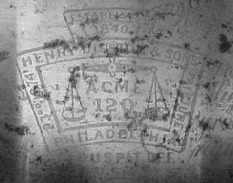
|
The Disston 120 or "Acme" saw was a special model made from 1876 until about 1928. It features an ultra-tapered and hardened blade, filing with tall, narrow gullets, and no tooth set. The purpose was to have a saw that could cut so smoothly in furniture-grade dry hardwoods that joints and miters could be assembled with no need for planing. The saw's etch has instructions for its use and maintenance with a special "safe-back" cant file. This is a three-sided file with two 30-40 degree angles. One face of the file was toothed and two were not, hence the "safe-back". This allowed filing of one face of the saw tooth at a time during sharpening. These files are no longer available. Standard cant files are used to sharpen crosscut saws (saws used to fell trees).

|
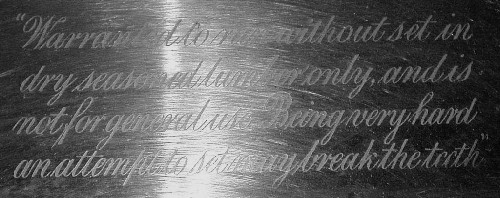 |
The Acme saw was reintroduced as the D-120 when the Disston line was changed in 1928. It was carried for only a year or two and dropped from production.
Its overall appearance is similar to a D-8 saw, with the addition of carving on the handle. The etch reads: "Warranted to run without set in dry seasoned lumber only and is not for general use. Being very hard, any attempt to set may break the teeth." So much script on a saw looks like the Gettysburg Address.
|
|
An Acme 120 saw being found today with the proper filing is rare. The special files have been out of production for several decades, and the saws nearly always have been filed conventionally. It's a testament to the toughness of the steel that many of the saws' teeth have been set without breaking. Conventional filing defeats the purpose of the Acme 120 design, however.
Other specialty saws in the Disston line included the No. 77 handsaw and backsaw models, both with a similar ultra-taper design for use without set; the No's. 240 and 340 steel-cutting hacksaws shaped like a handsaw; and a No. 7 handsaw with a detachable back for backsaw use.
|
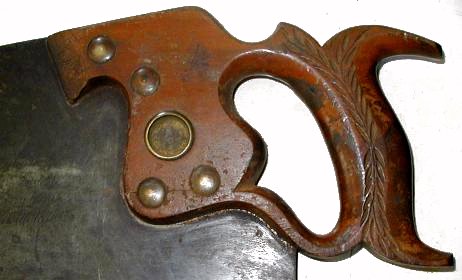 |
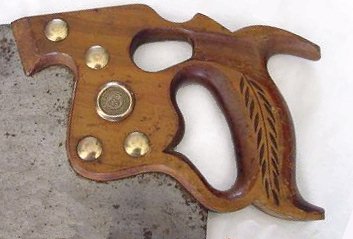
|
The No. 120 Acme was available in the longest lengths with the thumbhole or "dual grip" handle. The 28" and 30" inch saws were mostly rip saws, but there were some sold with crosscut teeth in those lengths with the thumbhole handle. The thumbhole handle was also available on the D-8 and D-100 models.

|
Information taken from Disston 1876 catalog:

No. 120 ACME
Extra London Spring Steel, warranted, carved and polished apple handle .
|
|
Retail
per Dozen
|
|
Length
|
|
26"
|
$35
|
|
28"
|
$40
|
|
30"
|
$45
|
Information taken from Disston 1890 catalog:
If you cannot be supplied through your dealer, write us.

No. 120 Patent Skew-back Handsaw
Special attention is called to the style of tooth in this saw. Extra London, Spring, warranted. Carved and polished Apple Handle, 5 rivets, highly finished.
A fast, smooth cutting saw. Runs entirely without set in dry seasoned lumber. Designed only for first-class workmen.
|
|
Retail
per Dozen
|
|
Length
|
|
16"
|
$23.00
|
|
18"
|
$25.00
|
|
20"
|
$27.00
|
|
22"
|
$30.00
|
|
24"
|
$32.00
|
|
26"
|
$33.00
|
|
28"
|
$38.00
|
|
30"
|
$43.00
|
Information taken from Disston 1906, 1911, and 1914 catalogs:
Note: The product line was its broadest at this time. Points per inch are not specified so it may be safe to assume the customer could special order any practical number of points on a saw.
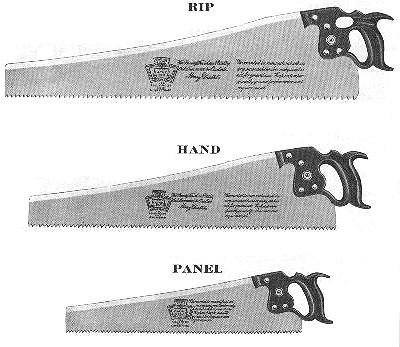
No. 120
Acme Skewback, Extra London Spring Steel, Selected and Highly Polished Blade
Warranted, Apple Handle, Carved and Polished, Brass Screws.
Prices per dozen Retail
|
Length
|
16"
|
18"
|
20"
|
22"
|
24"
|
26"
|
28"
|
30"
|
|
Price
|
$22
|
$24
|
$26
|
$29
|
$31
|
$32
|
$36
|
$40
|
Information taken from Disston 1918 catalog:

No. 120 Acme
Skewback, Extra Refined London Spring Steel, Selected and Highly Polished Blade,
Warranted, Apple Handle, Carved and Polished, Brass Screws.
Manufactured only in the following lengths and points.
Thumbhole in handle of 28-inch:
|
|
inches
|
points
|
retail
|
|
Cross Cut
|
|
|
|
|
|
20
|
10, 11
|
$26.00 per dozen
|
|
|
22
|
10, 11
|
$29.00
|
|
|
24
|
9, 10, 11
|
$31.00
|
|
|
26
|
7, 8, 9, 10, 11
|
$32.00
|
|
Rip
|
|
|
|
|
|
26
|
5, 5 1/2, 6
|
$32.00
|
|
|
28
|
5, 5 1/2, 6
|
$36.00
|
NOTE: A fast, smooth-cutting saw; particularly adapted for fine cabinet work, sawing mitres, and in all instances where rapid, smooth cutting is required. It will cut a joint sufficiently smooth to glue without planing. In sharpening, care must be used to file the teeth at the same angle as they leave the factory. These saws are warranted to run without set in dry, seasoned lumber only, and are not for general use. They are high in temper, specially ground for clearance and requite no set.
To properly file the No. 120 saw, a DISSTON SIX-INCH CANT SAFE BACK FILE, made expressly for this purpose, should be used.
Information taken from Disston 1922 catalog:

NO. 120 ACME SAW
The Disston No. 120 Acme Saw is not an ordinary type of hand saw and should not be used for ordinary work. It is designed for sawing dry, seasoned lumber only, and cannot be used successfully for general work. It is a fast, smooth-cutting saw for fine cabinet work, sawing mitres, etc. It will cut a joint sufficiently smooth to glue without planing, and is very popular with those doing extremely accurate sawing. It must be kept properly sharpened and should not be set. The Disston six-inch cant safe-back file is made expressly for filing this saw.
The No. 120 Saw is very high in temper. The blade is specially ground for clearance and the teeth require no set. The cost of the No. 120 is slightly more than the No. 12 in the regular hand saws. It is made in lengths from 16 to 30 inches with cross-cut or rip teeth.
Lengths (inches):
16, 18, 20, 22, 24, 26, 28, 30.
Information taken from Disston 1924 and 1926 catalogs:

NO. 120 ACME SAW
The Disston No. 120 Acme Saw is not an ordinary type of hand saw and should not be used for ordinary work. It is designed for sawing dry, seasoned lumber only, and cannot be used successfully for general work. It is a fast, smooth-cutting saw for fine cabinet work, sawing mitres, etc. It will cut a joint sufficiently smooth to glue without planing, and is very popular with those doing extremely accurate sawing. It must be kept properly sharpened and should not be set. The Disston six-inch cant safe-back File is made expressly for filing this saw.
The No. 120 Saw is very high in temper. The blade is specially ground for clearance and the teeth require no set. The cost of the No. 120 is slightly more than the No. 12 in the regular hand saw.
Lengths (inches):
Crosscut -- 20, 22, 24, 26.
Rip -- 26, 28. (1926, 26 inches only)
The No. 120 does not appear in the 1927 catalog.
Information taken from Disston 1928 brochure:

D-120 Regular Pattern Skew Back
Hollow ground for clearance, no set required. Blade made narrower.
Shape of teeth changed, easier to file.
Disston Special Extra-Slim Blunt Saw File should be used in sharpening. High in temper.
Carved applewood handle, carved, new weatherproof finish.
Nickel-plated screws. Made in 26" length only.
Price, 26" length, $5.95 each
|
|
length
|
points
|
|
cross-cut
|
26"
|
7, 8, 9, 10, 11
|
|
rip
|
26"
|
5 1/2
|
 [BACK HOME]
[BACK HOME]














